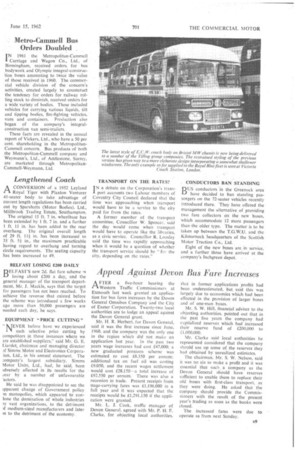Appeal Against Devon Bus Fare Increases
Page 43

If you've noticed an error in this article please click here to report it so we can fix it.
AFTER a five-hour hearing the Western Traffic Commissioners at Exmouth last week granted an application for bus fares increases by the Devon General Omnibus Company and the City of Exeter Corporation. Twenty-two local authorities are to lodge an appeal against the Devon General grant.
Mr. H. R. Herbert. for Devon General, said it was the first increase since June. 1960, and the company was the only one in the region which did not make an application last year. In the past two years wage increases had cost £47,000; a new graduated pensions scheme was estimated to cost £8.350 per annum; additional tax on fuel oil was costing £9,050, and the recent wages settlement would cost £28,150—a total increase of £92,550 per annum. There was also a recession in trade. Present receipts from stage-carrying fares was £1,196,000 in a full year and it was expected that the receipts would be £1,291,150 if the application were granted.
Mr. L. I. Cook, traffic manager of Devon General. agreed with Mr. P. H. F. Clarke, for objecting local authorities, that in former applications profits had been underestimated, but said this was largely due to economies which had been effected in the provision of larger buses and of one-man buses.
Mr. S. W. Hill, financial adviser to the objecting authorities, pointed out that in the past five years the company had capitalized reserves which had increased their reserve fund of £200,000 to L1.000,000.
Mr. Clarke said local authorities he represented considered that the company should use up some of the reserves they had obtained by unrealized estimates, The chairman; Mr. S. W. Nelson, said it was no sin to make a profit and it was essential that such a company as the Devon General should have reserves sufficient to enable them to replace their old buses with first-class transport, as they were doing. He asked that the company should provide the Commissioners with the result of the present year's trading as soon as the books were closed.
The increased fares were due to operate as from next Sunday.




















































































































